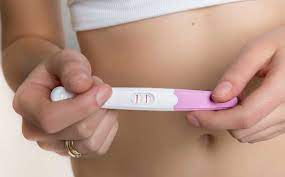
Can you get pregnant on your period? It’s a common question women ask, whether they’re hoping to have a baby or trying to avoid pregnancy altogether. The answer can be tricky, given how confusing the timing of ovulation can be. That said, we reached out to experts to find out once and for all whether getting pregnant on your period—or directly before or after it—is even a possibility, and how to figure out when you’re least and most fertile.
Knowing Ovulation and Your Menstrual Cycle
Before we dive into whether you can get pregnant on your period, let’s first talk about ovulation, since understanding how your cycle works is key here—and regardless of whether you’re trying to conceive or avoid pregnancy, timing when to have relation is a main thing.
Ovulation happens when your ovary releases a mature egg. The average length of a cycle—from the first day of your period to the first day of your next period—is 28 days, but that varies greatly from women to women. In fact, cycles that last anywhere from 24 to 35 days are considered normal.
Can You Get Pregnant on Your Period?
Now that you better understand your menstrual cycle, ovulation and your fertile window, we can get down to the question at hand: Can you get pregnant on your period? Answer: While extremely unlikely, it is technically possible, under rare circumstances. Several factors determine whether you can get pregnant on your period, including the length of your menstrual cycle, when you ovulate and the amount of time the sperm survive.
So, why is getting pregnant on your period so unlikely? It’s all a matter of simple math. Depending on when during your period you have relation with your partner, you’ll likely have at least seven days, if not more, before you ovulate. The sperm isn’t likely to survive that long, which is why “a woman with a regular menstrual cycle will not get pregnant on her period”.
Can You Get Pregnant Right After Your Period?
So it’s way harder to get pregnant on your period than when you’re not—but can you get pregnant right after your period? It depends on what you mean by “right after.” If you mean no more than one day after your period ends, then “in most cases, no,”. The only exception? “If you have a very short cycle and long bleeding periods,”. In that case, if you bleed until day seven, have sex on day eight and ovulate on day nine or 10, it’s definitely possible to become pregnant.
For women with normal cycles, though, the chances of getting pregnant start to increase only as you get closer and closer to your window of fertility. Again, most women ovulate between day 12 and day 21 of their cycles—so if you have relation with your partner just two days after your period ends, say on day seven, you’re only five days away from ovulation. So if your partner’s sperm swimming around—the ones that last as long as five days—there’s a chance you could get pregnant.
Can You Get Pregnant Right Before Your Period?
So what about your chances of conception just before you menstruate? Can you get pregnant the day before your period? The closer you are to your period when you have relation, the less likely it is that you’ll get pregnant. That’s because it puts you further away from the time of ovulation, and, as we mentioned, the egg lasts for only a day at most. The number of “safe days” right before your period will increase with longer cycles and decrease with shorter cycles. For women with a regular cycle, having unprotected sex the day before your period is extremely unlikely to result in a pregnancy—“almost no chance,”
Conclusion:
Getting pregnant on (or around) your period is rare, but it’s not impossible, given the right conditions. Whether you’re in family planning mode or trying to avoid getting pregnant, it’s important to understand the timing of your cycle and track your ovulation—either with Ovulation app, or checking your body temp and on ovulation kit—to help you make informed decisions about when to have relation with your partner. Hence, you should always consult with a qualified physician or health professional about your condition.
